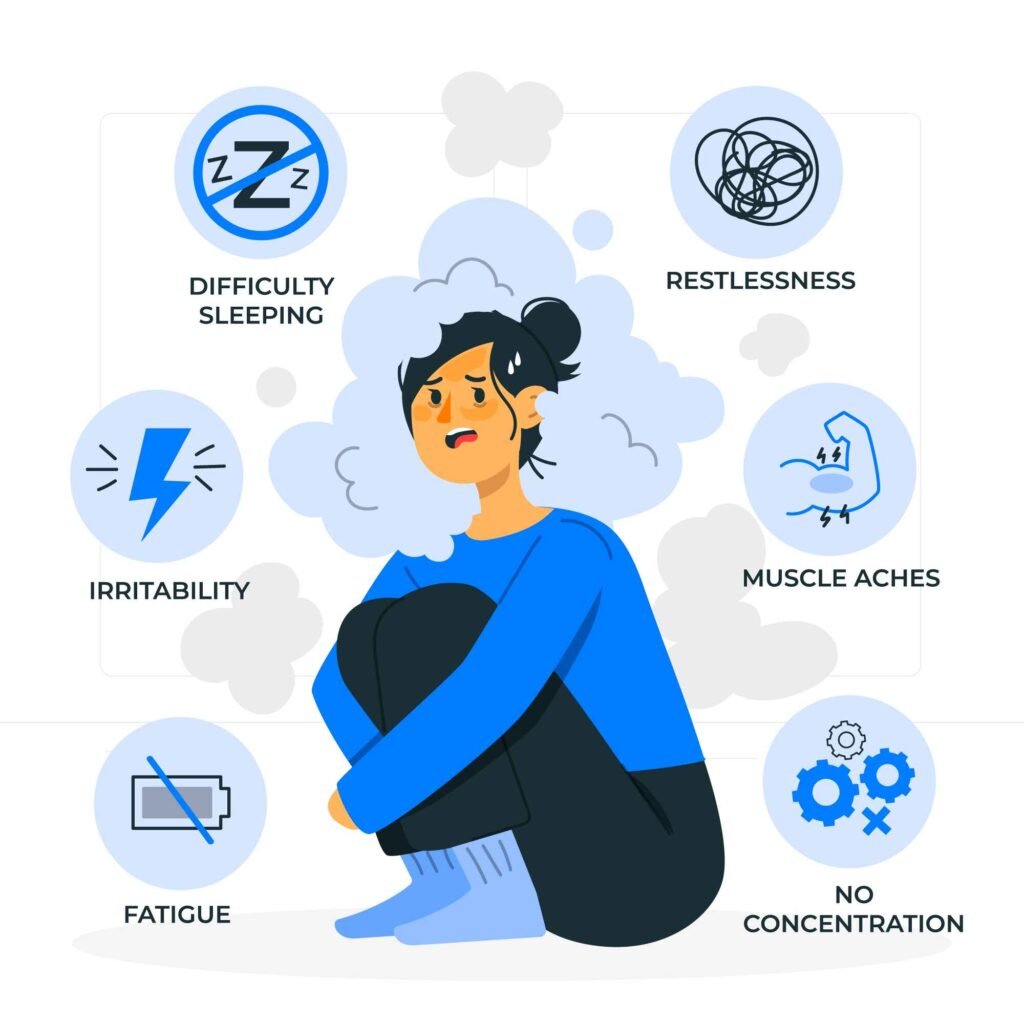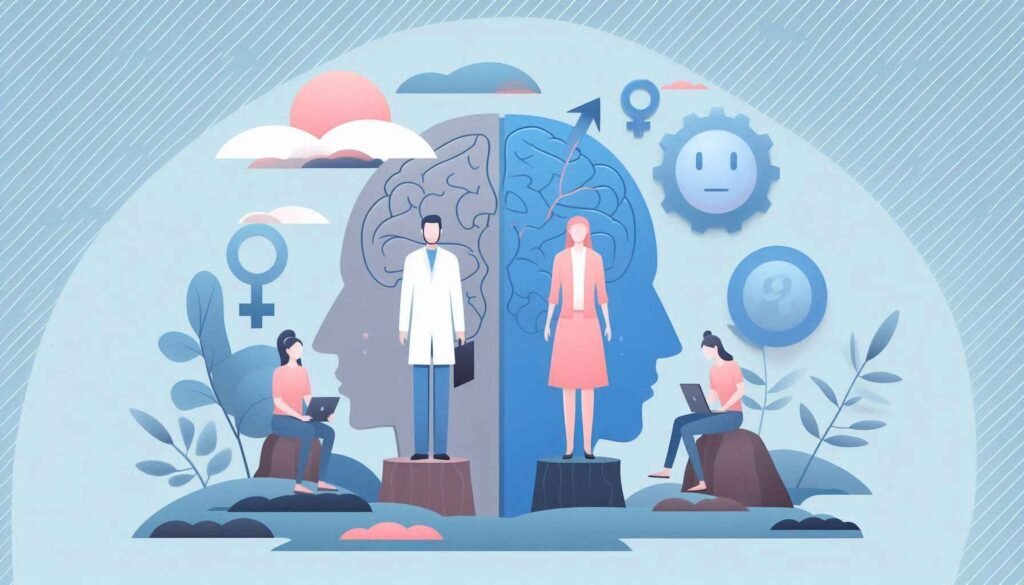
The Role of Physical Fitness in Men’s Mental Health: How Exercise Impacts Well-being
Introduction
In today’s fast-paced world, men’s mental health often takes a back seat, overshadowed by work, family responsibilities, and societal expectations. However, maintaining mental well-being is essential, not just for leading a happy life but also for fulfilling these obligations effectively. Physical fitness plays a critical role in promoting mental health, acting as a natural and accessible remedy for stress, anxiety, and depression. This article delves into the significant connection between physical fitness and mental health in men, exploring how exercise can lead to a healthier, happier life.
Part 1: The Science Behind Physical Fitness and Mental Health
How Exercise Impacts Brain Chemistry
Physical activity has a direct impact on brain function, stimulating the release of neurotransmitters such as endorphins, serotonin, and dopamine. Known as “feel-good chemicals,” these neurotransmitters are responsible for uplifting mood and reducing stress levels. Regular exercise also decreases the production of cortisol, the hormone associated with stress, helping men better manage daily challenges.
- Endorphins: Often referred to as the body’s natural painkillers, endorphins are released during physical activity, creating a sense of euphoria and reducing the perception of pain.
- Serotonin: Exercise helps regulate serotonin levels, which can improve mood and sleep—two critical components of mental health.
- Dopamine: Known for its role in pleasure and motivation, dopamine levels increase with regular workouts, boosting energy and focus.
Reducing the Risk of Depression and Anxiety
Numerous studies suggest that men who engage in regular physical activities are less likely to experience depression and anxiety. Exercise promotes neural growth, reduces inflammation, and fosters new activity patterns in the brain, leading to feelings of calmness and well-being.
- Improved Coping Mechanisms: Men often face societal pressures to “stay strong” or “man up,” which can discourage open discussions about mental health. Physical fitness offers an outlet for managing stress and processing emotions in a healthy way.
- Breaking the Cycle of Negativity: Regular exercise helps disrupt negative thought patterns, replacing them with a sense of accomplishment and optimism.
Part 2: Physical Fitness as a Preventive Tool for Mental Health Issues
Exercise and Stress Management
Stress is an inevitable part of life, but unmanaged stress can lead to significant mental health challenges. Exercise provides a natural solution for stress relief by engaging the body and mind in productive activities.
- Aerobic Exercises: Activities like running, swimming, or cycling improve cardiovascular health while simultaneously reducing stress.
- Strength Training: Weightlifting and resistance training boost confidence by improving physical strength, which can translate to greater emotional resilience.
Building Mental Resilience Through Fitness
Consistency in physical fitness routines fosters discipline, a crucial aspect of mental resilience. Men who prioritize regular workouts develop a stronger mindset, enabling them to handle life’s difficulties more effectively.
- Mind-Body Connection: Activities like yoga and tai chi not only improve flexibility and strength but also emphasize mindfulness, helping men stay present and focused.
- Confidence and Self-Esteem: Achieving fitness goals, whether it’s running a marathon or lifting heavier weights, builds confidence and self-esteem, both of which are essential for mental health.
Social Benefits of Group Fitness
Group fitness activities, such as joining a local sports team or participating in fitness classes, provide opportunities for social interaction and camaraderie. Building meaningful relationships through shared activities can reduce feelings of isolation, a common trigger for mental health struggles in men.
Start Small: Simple Fitness Routines to Get You Moving
Getting started with exercise doesn’t have to mean long hours at the gym or intense workouts. For many men, the idea of fitness can feel overwhelming, especially if they’ve been inactive for a while. However, the key to reaping mental health benefits is consistency, not intensity. Here are some simple ways to get moving:
- Brisk Walks: A 20-minute walk around the neighborhood can work wonders for reducing stress. Walking not only boosts cardiovascular health but also clears the mind and lifts mood.
- Bodyweight Exercises: Push-ups, squats, and lunges can be done at home with no equipment. These exercises build strength, improve stamina, and boost self-esteem.
- Stretching and Flexibility: Daily stretching or short yoga sessions help release physical tension and improve mobility, which can significantly reduce anxiety.
Finding an Exercise Routine That Works for You
The best workout routine is the one you enjoy and can stick with. Exercise should not feel like a chore but an opportunity to unwind, reflect, and reconnect with yourself. Consider the following options:
- Strength Training: Weightlifting or resistance training is excellent for boosting testosterone levels, which can help improve mood, energy, and focus.
- Cardio Workouts: Running, swimming, or cycling can reduce symptoms of depression and anxiety by increasing endorphins and improving heart health.
- Sports and Group Activities: Joining a basketball league, soccer team, or martial arts class can combine the benefits of physical activity with social interaction.
The key is to find an activity that excites you. When exercise feels enjoyable, you’re more likely to make it a regular habit.
Create a Consistent Fitness Schedule
Consistency is where the magic happens. Establishing a workout routine and sticking to it helps create structure in your life, which can have profound effects on mental health. To stay consistent:
- Set Realistic Goals: Start with achievable goals like exercising three times a week. As you progress, gradually increase frequency or intensity.
- Time Management: Schedule workouts like appointments. Early mornings, lunch breaks, or evenings—find what works best for your lifestyle.
- Track Progress: Use fitness apps or a journal to track your workouts and milestones. Seeing your progress boosts motivation and reinforces a sense of achievement.
Overcoming Common Barriers to Fitness and Mental Well-being
Breaking Through Mental Blocks
Sometimes the biggest obstacle to fitness is mental, not physical. Negative thought patterns, low motivation, and fear of failure can keep men from starting or maintaining a workout routine. Here’s how to overcome these mental hurdles:
- Mindset Shift: Focus on the mental benefits of exercise rather than just physical results. Remember that each workout is an investment in your mental health.
- Set Short-Term Rewards: Reward yourself for sticking to your workout plan. After completing a week of exercise, treat yourself to something enjoyable.
- Affirmations and Visualization: Positive self-talk and visualizing success can boost motivation and help overcome self-doubt.
Balancing Work, Family, and Fitness
Busy schedules are a common excuse for skipping exercise. Balancing work, family, and personal time can be challenging, but prioritizing fitness is essential for mental well-being. Here are some strategies:
- Combine Fitness with Family Time: Go for family bike rides, play sports with your kids, or take walks together. This keeps you active while bonding with loved ones.
- Micro Workouts: If time is limited, short, high-intensity workouts (HIIT) can deliver significant benefits in just 15-20 minutes.
- Workplace Wellness: If possible, incorporate exercise into your workday. Take walking meetings, use a standing desk, or do quick stretches during breaks.
Addressing Physical Health Challenges
Injuries, chronic pain, or other physical limitations can make exercise seem difficult. However, adapted fitness routines can still provide mental health benefits.
- Low-Impact Options: Swimming, cycling, or elliptical training are gentle on joints and suitable for those with mobility issues.
- Consult a Professional: A physical therapist or fitness coach can design a workout plan tailored to your specific needs and abilities.
The Long-Term Benefits of Fitness for Men’s Mental Health
Improved Self-Esteem and Confidence
Regular exercise helps men feel more in control of their lives, which is essential for self-esteem. Achieving fitness goals—whether it’s lifting a heavier weight, running faster, or staying consistent—fosters a sense of accomplishment and pride.
Enhanced Focus and Productivity
Exercise sharpens cognitive function, boosts concentration, and improves productivity. Men who exercise regularly often experience:
- Better Work Performance: Exercise reduces stress and enhances mental clarity, which translates to improved problem-solving and decision-making skills.
- Increased Energy Levels: Staying active combats fatigue and lethargy, helping you stay energized throughout the day.
Strengthened Emotional Resilience
Regular exercise helps men build mental toughness. By pushing through physical challenges, men learn to better cope with emotional difficulties. This resilience is crucial for navigating life’s ups and downs.
Reduced Risk of Mental Illnesses
Physical activity is a powerful preventive tool against mental illnesses like depression, anxiety, and mood disorders. Studies show that men who maintain a consistent fitness routine are:
- Less Likely to Develop Depression: Exercise acts as a natural antidepressant by increasing serotonin and dopamine levels.
- Better Equipped to Manage Anxiety: Regular workouts help regulate the nervous system, reducing symptoms of chronic anxiety.
The Importance of Routine and Discipline
Consistency in physical fitness isn’t just about developing a six-pack or improving endurance—it’s about building a habit that supports long-term mental well-being. A structured exercise routine provides stability, discipline, and a sense of purpose, which are all critical for mental health.
- Daily Structure: Incorporating exercise into your daily routine creates a sense of order. When you know you have a workout planned, it gives you something to look forward to and helps you stay grounded.
- Discipline and Self-Control: Sticking to a fitness plan teaches you discipline and reinforces the belief that you can achieve your goals. This sense of control translates into other areas of life, improving your ability to manage stress and overcome challenges.
- Mental Clarity: Regular exercise helps declutter your mind, making it easier to tackle problems with a clear head. Whether you’re facing work pressures or personal issues, a quick workout can often provide the mental reset you need.
Setting Long-Term Fitness Goals for Sustained Mental Health
While short-term fitness goals are great for motivation, long-term goals are essential for sustained mental health benefits. These goals help you maintain focus, improve resilience, and provide a sense of accomplishment over time.
- SMART Goals: Set Specific, Measurable, Achievable, Relevant, and Time-Bound goals. For example, “I want to run a 5k in three months” or “I will exercise 30 minutes, 4 times a week for the next year.”
- Track Progress: Regularly reviewing your progress helps you stay motivated and gives you a sense of achievement. Apps, fitness journals, or even simple spreadsheets can be valuable tools for tracking workouts and milestones.
- Adapt and Evolve: As you achieve your goals, set new ones. This continuous evolution prevents boredom, keeps you challenged, and ensures your fitness journey remains engaging.
Making Exercise a Lifestyle, Not a Chore
To truly reap the mental health benefits of physical fitness, it needs to become a part of your lifestyle. This shift in mindset helps you see exercise not as an obligation but as a form of self-care.
- Incorporate Movement Throughout the Day: Exercise doesn’t have to be limited to the gym. Take the stairs instead of the elevator, stretch during work breaks, or do quick bodyweight exercises at home.
- Find Activities You Love: When you enjoy your workouts, they become something you look forward to. Whether it’s hiking, playing basketball, dancing, or martial arts, choose activities that make you feel good.
- Stay Flexible: Life can be unpredictable. If you miss a workout, don’t let it derail your routine. Adapt and get back on track the next day.
The Role of Support Systems in Fitness and Mental Health
The Power of Community and Accountability
Having a support system can make a world of difference in staying committed to physical fitness. Surrounding yourself with like-minded individuals who value health and well-being provides motivation, accountability, and a sense of belonging.
- Workout Partners: Exercising with a friend or partner can make workouts more enjoyable and keep you accountable. You’re less likely to skip a session when someone else is counting on you.
- Fitness Groups and Classes: Joining a fitness class, a running group, or a sports team fosters camaraderie and social connection, which are vital for mental health.
- Online Communities: Virtual fitness communities, forums, and social media groups provide inspiration, tips, and support from people around the world who share your goals.
Encouragement from Family and Friends
Openly sharing your fitness journey with loved ones can create a positive feedback loop. Their encouragement and support can boost your motivation and help you stay committed.
- Share Your Goals: Let your family and friends know about your fitness and mental health goals. Their understanding and encouragement can be a powerful motivator.
- Invite Participation: Involve your family in your workouts. Family hikes, bike rides, or group yoga sessions create shared experiences that benefit everyone’s mental health.
- Celebrate Milestones: When you reach a fitness goal, celebrate with loved ones. This reinforces the positive connection between fitness, mental health, and social bonds.
Integrating Mindfulness into Physical Fitness
Mindful Exercise for Mental Well-being
Combining mindfulness with physical fitness enhances the mental health benefits of exercise. Mindful exercise helps you stay present, focused, and connected to your body, reducing anxiety and stress.
- Focus on Your Breath: During workouts, pay attention to your breathing. Deep, controlled breaths can help you stay calm and centered.
- Engage Your Senses: Notice the sights, sounds, and sensations during your exercise. Whether you’re running in nature or lifting weights in the gym, engaging your senses keeps you in the moment.
- Body Awareness: Be mindful of how your body feels during exercise. This awareness helps prevent injuries and allows you to appreciate what your body can do.
Combining Yoga and Meditation with Traditional Exercise
Integrating yoga or meditation into your fitness routine can significantly boost mental health. These practices promote relaxation, flexibility, and a deeper mind-body connection.
- Yoga for Stress Relief: Yoga’s combination of physical postures, breathwork, and mindfulness helps release tension and calm the mind.
- Meditation After Workouts: A short meditation session after exercising can help you transition from physical activity to a state of relaxation and mental clarity.
- Stretching with Intention: Use post-workout stretching as an opportunity to reflect on your efforts and express gratitude for your health.
Fitness: The Lifelong Key to Men’s Mental Health
Why Physical Fitness Is More Than Just a Trend
Physical fitness is not a fad or temporary fix—it’s a lifelong tool for mental well-being. Prioritizing regular exercise can help men:
- Combat Loneliness and Isolation: Engaging in group activities and fitness communities fosters social connections and reduces feelings of loneliness.
- Maintain Emotional Stability: Exercise helps regulate emotions, making it easier to navigate life’s ups and downs.
- Stay Resilient During Tough Times: Physical fitness builds mental toughness, helping men face challenges with greater confidence and perseverance.
Commit to a Healthier, Happier You
The journey to better mental health through physical fitness is not about perfection. It’s about progress, consistency, and self-care. By committing to regular exercise, you’re investing in your overall well-being and taking proactive steps to lead a healthier, happier life.



